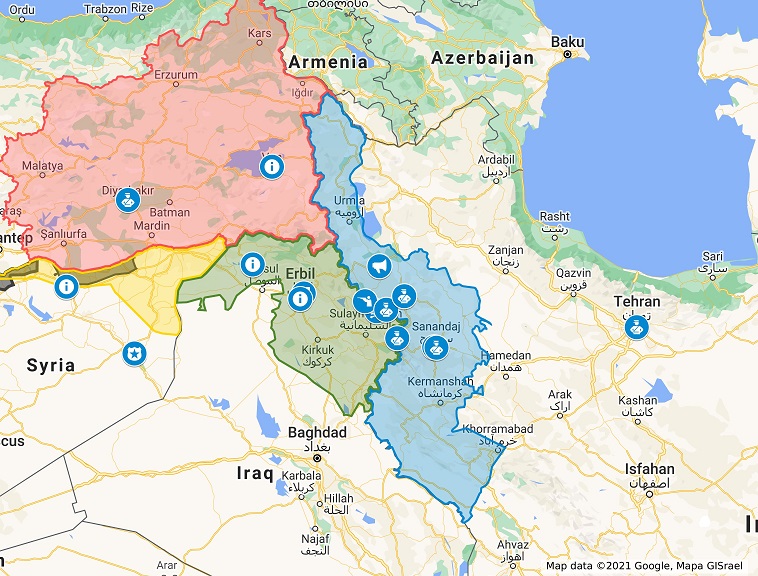1.2K
Iran
- On Thursday, November 10th, the Iranian regime’s security forces–mainly its intelligence agency (Ettela’at) and the Iranian Revolutionary Guard Corps (IRGC)–launched a massive raid-and-arrest campaign in the Kurdish cities of Sanandaj, Baneh, Marivan, and Saqqez. As a result, an estimated 32 Kurdish civilians and activists have been arrested. Human rights groups have reported planes and large-scale military forces used during Iran’s raiding of the Kurdish mountainous areas. Additionally, the Ettela’at arrested a 70-year old former political prisoner, Omar Sharifi. Human rights groups and the Cooperation Center for Iranian Kurdistan’s Political Parties (CCIKP) denounced Tehran’s crackdown on the Kurds. The CCIKP appealed to the international community to take a “stance” on the ongoing crisis in Iranian Kurdistan.
- In London, several international human rights groups took part in a four-day hearing testimony of witnesses whose family members were killed by the Iranian regime during the anti-government protests in the Fall of 2019. The hearing is part of the International People’s Tribunal on Iran’s Atrocities and holds the proper authorities accountable for crimes committed against protestors in Iran. A Kurdish witness to the events, Aram Mardokhi, said that Iranian snipers shot civilians during the protests. The snipers in question were led by the Head of Security, Sarang Jawamermargi. Additionally, an Iranian news website said that it has audio evidence of the Deputy Chairman of the Judicial Committee, Hassan Norouzi, admitting to killing protesters. In the 2019 Fall protests, 1,500 civilians were killed, but Tehran continues to deny such casualties.
- Iranian teachers across the country, including in the Kurdish region, held protests on Thursday demanding both unpaid salaries and an increase of wages, as the Iranian cost of living has dramatically increased in recent years. The Kurdish opposition parties supported the protests and called for more reforms in education, including teaching in languages other than Farsi.
- Iranian border guards wounded a Kurdish border-porter (Kolbar) named Karim Khandedar near the northern border of Sardasht last Monday. At the same time, a landmine injured an 18-year old Kolbar named Arvin Showkati, near western Baneh on Sunday.
Iraq
- Following the failed assassination attempt of Prime Minister Mustafa al Kadhimi by Iranian-backed militias, the Iranian Commander of al Quds forces in the Islamic Revolutionary Guard Corps (IRGC) Esmael Qaani visited Iraq, including the Kurdistan Region. According to several media reports, Qaani held meetings with top Iraqi officials in addition to military commanders. In Kurdistan, Qaani allegedly told the Kurdish officials “not to get involved in internal Shia disputes.” Qaani replaced Qassim Solemani, who was killed by a US strike in December of 2019.
- Thousands of Kurdish refugees remain trapped on the Belarus-Poland borders for the second week. At least two people died from hunger and cold, including a 14-year old who died in the freezing temperatures. Both Belarusian and Polish authorities have deployed thousands of troops alongside their borders as the Kurdish refugees became a pressure card by the Belarusian regime and the European Union (EU).
- Osman Ocalan, the younger brother of the imprisoned Kurdish leader Abdullah Ocalan, passed away on Monday due to COVID. Osman Ocalan defected from the Kurdistan Workers’ Party (PKK) in 2004 and settled in the Kurdistan Region of Iraq. Ocalan remained banned from returning to Turkey.
Syria
- The commander of the Kurdish-led Syrian Democratic Forces (SDF), Mazloum Abdi, told al-Monitor that President Biden spoke with Turkish President Erdogan about how the U.S. will not accept a new attack from Turkey in the Rojava region. However, in a statement, the SDF said that Turkey and its radical proxies continue targeting Tal Tamer, Ain Essa, and Tal Abyad towns with heavy weapons. The SDF said the “daily attacks” add to the mounting food security dilemmas facing the people of the region. Turkish proxies also reportedly bombarded Zarkan (Abu Rasen). Separately, a U.S. delegation, led by the Deputy Assistant Secretary of State for Near Eastern Affairs, visited the region and met with Abdi and Ilham Ahmed, the Syrian Democratic Council (SDC) leader.
- Last week, the SDF arrested four Da’esh terrorists in joint operations with the US-led coalition, including Jadeed Ekedat of the Deir Ez Zor province. The SDF announced the sears of Da’esh weapons and ammo as well.
Turkey
- In the most recent oppression against the Kurds, a Diyarbakir (Amed) High Criminal Court sentenced Basak Demirtas, the wife of the jailed Kurdish politician Selahattin Demitas, to thirty months in prison for “falsified” medical records. However, Demirtas’s lawyers denied such charges and explained that a physician’s typo was used in the political case.
- The Peoples’ Democratic Party (HDP) submitted its preliminary defense in the government’s closure case it is facing. The Turkish Chief Public Prosecutor of the Court of Cassation is set to respond within a month, and the HDP will be granted one month to file its primary defense. Meanwhile, lawyers and some of the Kurdish politicians boycotted the sixth hearing session of what is known as “Kobani Trials” against 106 HDP politicians and jailed lawmakers. The court judge ordered a criminal complaint against the lawyers.
- Constant jailing of those using the word “Kurdistan” led to a Kurdish lawmaker of Van province, Murat Sarısaç, formally filing questions to Turkey’s Vice President, Fuat Oktay. “Is it illegal to refer to a cultural and historical geography where Kurds have lived for millennia as ‘Kurdistan’? If so, what is the rationale for this prohibition?” asked Sarısaç alongside three other questions.

